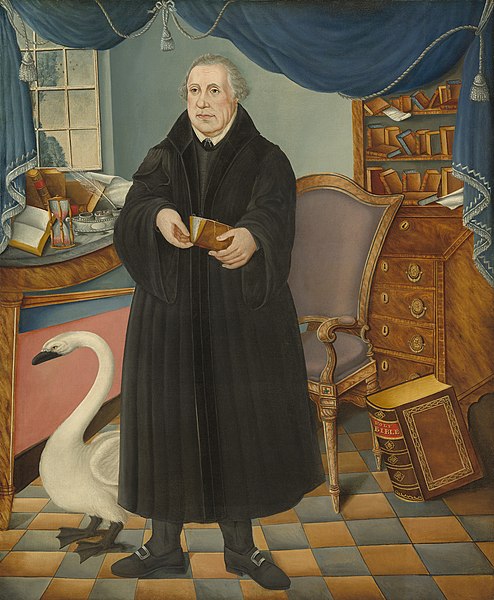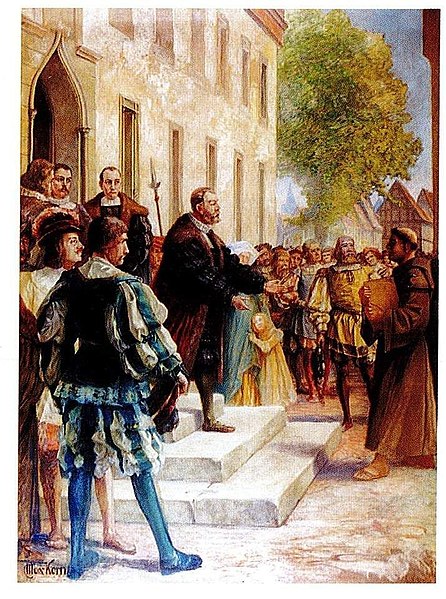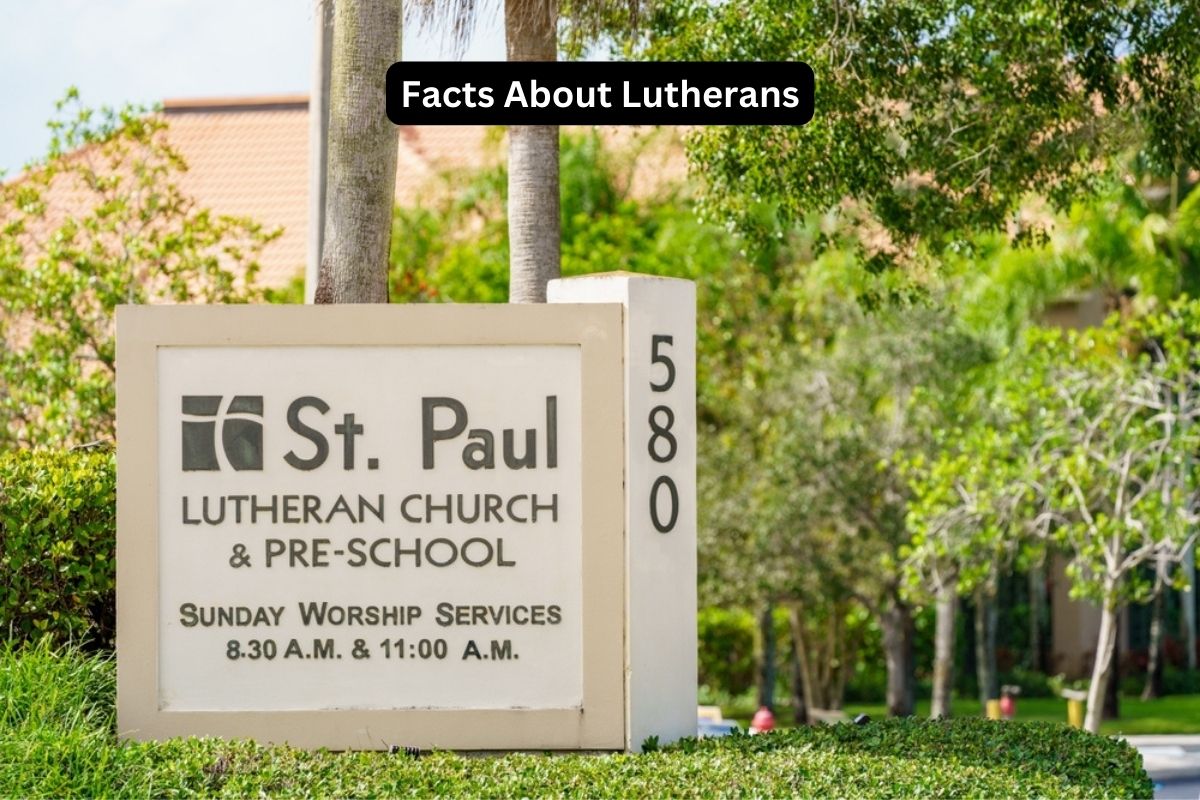Lutheranism is a Christian denomination that emerged during the Protestant Reformation in the 16th century, named after its founder, Martin Luther.
Lutherans place a strong emphasis on the Bible as the ultimate source of authority, believe in salvation by faith alone, and have a rich liturgical tradition.
They recognize two sacraments, Baptism and the Eucharist, and maintain a diverse global presence with various denominations and synods.
This branch of Christianity is known for its theological distinctives, its contributions to hymnody, and its commitment to ordained clergy and structured worship services.
Lutherans Facts
1. Named after Martin Luther, a German reformer
Lutheranism gets its name from Martin Luther, a German theologian and professor of theology. In the early 16th century, Luther became a key figure in the Protestant Reformation.
He is best known for his 95 Theses, which he posted on the door of the Castle Church in Wittenberg, Germany, in 1517. This act is often seen as the catalyst for the Reformation.
Also Read: Famous Lutherans
Luther’s teachings emphasized salvation by grace through faith in Jesus Christ, as opposed to the Catholic Church’s teachings of salvation through good works.

2. Believe in “Sola Scriptura” (Bible as ultimate authority)
Lutherans adhere to the principle of “Sola Scriptura,” which means “Scripture alone” in Latin. This principle asserts that the Bible is the ultimate and authoritative source of Christian doctrine and practice.
Also Read: Atheists Facts
Lutherans believe that the Bible contains all the teachings necessary for faith and life and should be the foundation for all Christian beliefs.
This emphasis on the Bible’s authority was central to Luther’s efforts to reform the church and remains a defining characteristic of Lutheranism.
3. Have doctrinal statements called Lutheran Confessions
Lutheranism is characterized by a set of doctrinal statements known as the Lutheran Confessions. These confessions include texts such as the Augsburg Confession and the Small and Large Catechisms, all of which were written by Martin Luther and other early reformers.
The Augsburg Confession, presented in 1530, is the most famous of these documents. These confessions serve as a theological framework for Lutheran beliefs and practices.
They address key theological issues, including the nature of God, salvation, the sacraments, and the church’s role.
4. Emphasize justification by faith alone
Lutherans place a significant emphasis on the doctrine of justification by faith alone, often referred to as “sola fide.” This teaching asserts that a person is justified, or declared righteous before God, solely through faith in Jesus Christ, apart from any merit or good works on their part.
This belief was a central point of contention during the Protestant Reformation, as Martin Luther opposed the Catholic Church’s teaching that good works contributed to a person’s justification.
Lutherans believe that faith in Christ’s atoning work on the cross is the means by which individuals are reconciled with God and receive the gift of salvation.
5. Often have liturgical worship services
Many Lutheran churches have a liturgical worship tradition. Liturgy refers to a structured order of worship that typically includes elements like hymns, liturgical readings from the Bible, prayers, and the celebration of the Eucharist (Holy Communion).
Lutherans often follow the historic Christian liturgical calendar, which includes seasons such as Advent, Lent, Easter, and Pentecost. The liturgical worship style is characterized by its formality and reverence, with a focus on the Word of God and the sacraments.

6. Comprise various church bodies and synods
Lutheranism is not a single, unified denomination but is instead divided into various church bodies and synods, each with its own distinct beliefs and practices. These denominations and synods exist on both a national and international level.
For example, in the United States, there are denominations like the Evangelical Lutheran Church in America (ELCA) and the Lutheran Church—Missouri Synod (LCMS), each with its own governing structure, theological positions, and congregations.
The diversity within Lutheranism can range from more liberal to more conservative interpretations of Lutheran theology and practice.
7. Recognize two sacraments: Baptism and Eucharist
Lutherans typically recognize two sacraments: Baptism and the Eucharist (Holy Communion). These sacraments hold a central place in Lutheran theology and practice.
- Baptism: Lutherans believe that in Baptism, individuals are washed of their sins and incorporated into the Christian community. It is seen as a means of grace through which God initiates a relationship with the believer. Lutherans often baptize infants as well as adults, emphasizing God’s prevenient grace.
- Eucharist (Holy Communion): The Eucharist, also known as the Lord’s Supper or Holy Communion, is celebrated in many Lutheran worship services. Lutherans believe in the real presence of Christ in the Eucharist, meaning that, in a mysterious way, Jesus is truly present in the bread and wine. This is often referred to as the doctrine of “the real presence” rather than “transubstantiation,” which is the Roman Catholic understanding. The Eucharist is seen as a source of spiritual nourishment and a means of receiving forgiveness and grace.
8. Have ordained clergy like pastors
Lutherans maintain a strong tradition of having ordained clergy, such as pastors and ministers, who lead congregations. These clergy members are typically trained and educated in theology, pastoral care, and other relevant fields.
Pastors are responsible for leading worship services, preaching sermons, administering the sacraments, providing pastoral care to their congregations, and teaching the faith.
9. Rich musical tradition with famous hymns
Lutherans have a rich musical tradition that dates back to Martin Luther himself, who composed many hymns. Music plays a significant role in Lutheran worship services, and congregational singing is highly valued.
Lutherans have contributed many well-known hymns to Christian worship, including “A Mighty Fortress Is Our God” and “Amazing Grace.” Choral music and organ music are also common features of Lutheran worship.
10. A global Christian movement with millions of members
Lutheranism is a global Christian movement with millions of members worldwide. While it has its historical roots in Germany, Lutheranism spread rapidly during the Protestant Reformation and has since established a presence in numerous countries.
Different Lutheran denominations and synods operate on a global scale, and Lutherans engage in various forms of ministry, mission work, and social service around the world.
Lutheranism has influenced the religious landscape in countries such as the United States, Sweden, Norway, and many others.
